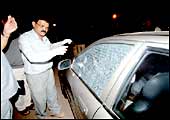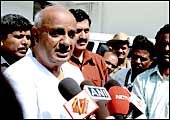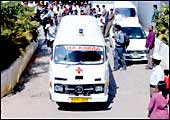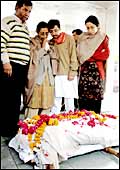 |
| Looking for clues: Forensic experts
at the National Science Seminar Complex |
BANGALORE AND HYDERABAD
January 4, January 5 and January 6
The
Infosys technologies campus in Bangalore's Electronic City these
days resembles a high security research facility in a Hollywood
movie. This correspondent, like most other journos in India's
Silicon City, has been there hundreds of times chasing stories
and fighting deadlines. But this time, it's different. Motion
detection cameras keep 24x7 watch on the electronic fencing around
its 80-acre campus; patrolling by its uniformed security guards
has been intensified; and the company has segregated the visitors'
car parking to contain the impact of a car bomb going off on its
campus. It's evident that the December 28 terror attack on the
Indian Institute of Science (IISC) has India's tech community
running scared, though no one will admit it on record. The Electronic
City Association, an umbrella organisation representing all occupants
of the eponymous campus, has asked the government to set up police
and fire stations in the area and intensify police patrolling
there.
Across the city, Wipro has also tightened
its security. "We have well established security processes
in and around our facilities. They are always geared to meet any
untoward incident. Additional security controls have also been
implemented in view of the recent incidents," says a company
spokesperson. "The perception of Bangalore as a safe city
has changed as a result of the attack," says a senior Wipro
executive.
 |
| Consoling Puri's family: Ex-PM H.D.
Deve Gowda (L) briefs reporters outside M.S. Ramaiah Hospital |
"The attack on Bangalore could be one
of the contributing factors that affect its standing as a secure
location to set up shop," says a security analyst with Hill
& Associates, a Hong Kong-based risk management and business
intelligence firm.
Cut to the evening of December 28. The scene
in front of the J.N. Tata auditorium, part of the National Science
Seminar Complex, at IISC is chaotic. There are swarms of policemen,
scientists, news hounds and curious passers-by milling around,
confounding the confusion. It's 8.00 p.m.; an hour since an unidentified
gunman (some reports said there were more than one) opened fire
on a group of 300 scientists and academics who were proceeding
to the nearby dinner hall after wrapping up the three-day 38th
Annual Convention of Operations Research Society of India, killing
M.C. Puri of the Indian Institute of Technology (IIT), Delhi,
on the spot and injuring four others, including Vijay Chandru,
inventor of the Simputer.
The law enforcement agencies have cordoned
off the area; and combing teams with their sniffer dogs are going
through the campus inch-by-inch looking for clues. They discover
a couple of spent grenades, half a dozen magazines (to store bullets,
not read) and a Chinese-made ak-56 rifle.
 |
| The end: An ambulance taking Puri's
body out of M.S. Ramaiah Hospital |
The media is also caught up in the excitement.
Even as citizens of India's Silicon City are coming to terms with
their first taste of terrorism, the air waves are rife with live
reportage that sometimes borders on the hysterical; dire predictions
are being made about Bangalore's future as a global tech hub.
"This certainly is a blow to Bangalore's reputation as a
safe city," Infosys Chairman and Chief Mentor N.R. Narayana
Murthy tells reporters. A Red Alert has been sounded in neighbouring
metros such as Chennai and Hyderabad and all exit routes from
the city have been blocked.
As news of the attack filters in, public
sector enterprises and it companies, which have made Bangalore
their home, begin to review their security. The headquarters of
the Indian Space Research Organisation (ISRO), which is just a
10-minute drive from IISC, is ringed by a posse of gun-totting
CISF personnel and a rolling gate, which normally stays open,
is closed.
Meanwhile, within an hour of the attack in
Hyderabad, Satyam Computer convenes a meeting of key senior managers
and then declares "Code Delta", a heightened state of
security preparedness. "It (the terror attack) is something
that's bothering us, and yes, we've beefed up security. We've
even started the practice of randomly checking the bags of our
associates," says A.S. Murthy, Director, Satyam. Oracle,
which has its global security systems in place here as well, is
also reviewing its processes and has stepped up liaisoning with
the local law enforcement authorities.
 |
| Those left behind: Puri's family grieves
besides his body |
But despite the concern, the hype and some
of the knee-jerk reactions, the terror attack is unlikely to affect
the Indian it industry in the long-term. "I don't think the
recent attack has dented Bangalore's reputation... we have not
had a single client calling us about this issue. This is in stark
contrast to the deluge of calls we received a few of years ago
when Indo-Pak hostilities broke out. I also think Indian vendors
have better communications processes in place now and so, are
better prepared to address perception issues such as this one.
This helps allay client fears before they become a widespread
concern," says Partha Iyengar, Vice President at Gartner
Group, one of the world's leading technology consultancies.
Post script: The Andhra Pradesh police arrested
Abdul Rehman, a Bangladeshi national, from Nalgonda, 200 km from
Hyderabad, on January 3. Rehman is a "commander" in
the Lashkar-e-Taiba and the alleged mastermind of the attack on
IISC. He has been handed over to the Bangalore Police and remanded
to 14 days in custody.
|







